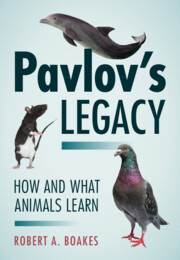Book contents
- Pavlov’s Legacy
- Pavlov’s Legacy
- Copyright page
- Contents
- Preface
- Acknowledgments
- 1 Ivan Pavlov, Conditioned Reflexes and Experimental Neuroses
- 2 Developing Habits
- 3 Learning Where Things Are and Where Events Happen
- 4 Fear, Avoidance, and Punishment
- 5 Comparative Psychology
- 6 Imprinting and Constraints on Learning
- 7 Discrimination Learning, Attention and Stimulus Generalization
- 8 B.F. Skinner and the Experimental Analysis of Behavior
- 9 How Animals Learn to Associate Events
- Notes
- References
- Index
2 - Developing Habits
Clark Hull and the Hullians
Published online by Cambridge University Press: 07 October 2023
- Pavlov’s Legacy
- Pavlov’s Legacy
- Copyright page
- Contents
- Preface
- Acknowledgments
- 1 Ivan Pavlov, Conditioned Reflexes and Experimental Neuroses
- 2 Developing Habits
- 3 Learning Where Things Are and Where Events Happen
- 4 Fear, Avoidance, and Punishment
- 5 Comparative Psychology
- 6 Imprinting and Constraints on Learning
- 7 Discrimination Learning, Attention and Stimulus Generalization
- 8 B.F. Skinner and the Experimental Analysis of Behavior
- 9 How Animals Learn to Associate Events
- Notes
- References
- Index
Summary
This chapter describes the theories of Clark Hull, who had an enormous influence on American psychology from the time he first wrote about - and reinterpreted - Pavlovs work in the early 1930s to well into the 1960s. Hulls ambition was to develop a general theory of learning and motivation based on the development of habits - as studied mainly in rats - that would provide psychology with the equivalent of Newtons contribution to physics. His vision inspired some of the brightest and most productive researchers into animal learning in the 1950s and 1960s. Important topics that the neo-Hullians studied included the partial reinforcement extinction effect and conditioning of visceral responses.
Information
- Type
- Chapter
- Information
- Pavlov's LegacyHow and What Animals Learn, pp. 26 - 50Publisher: Cambridge University PressPrint publication year: 2023
